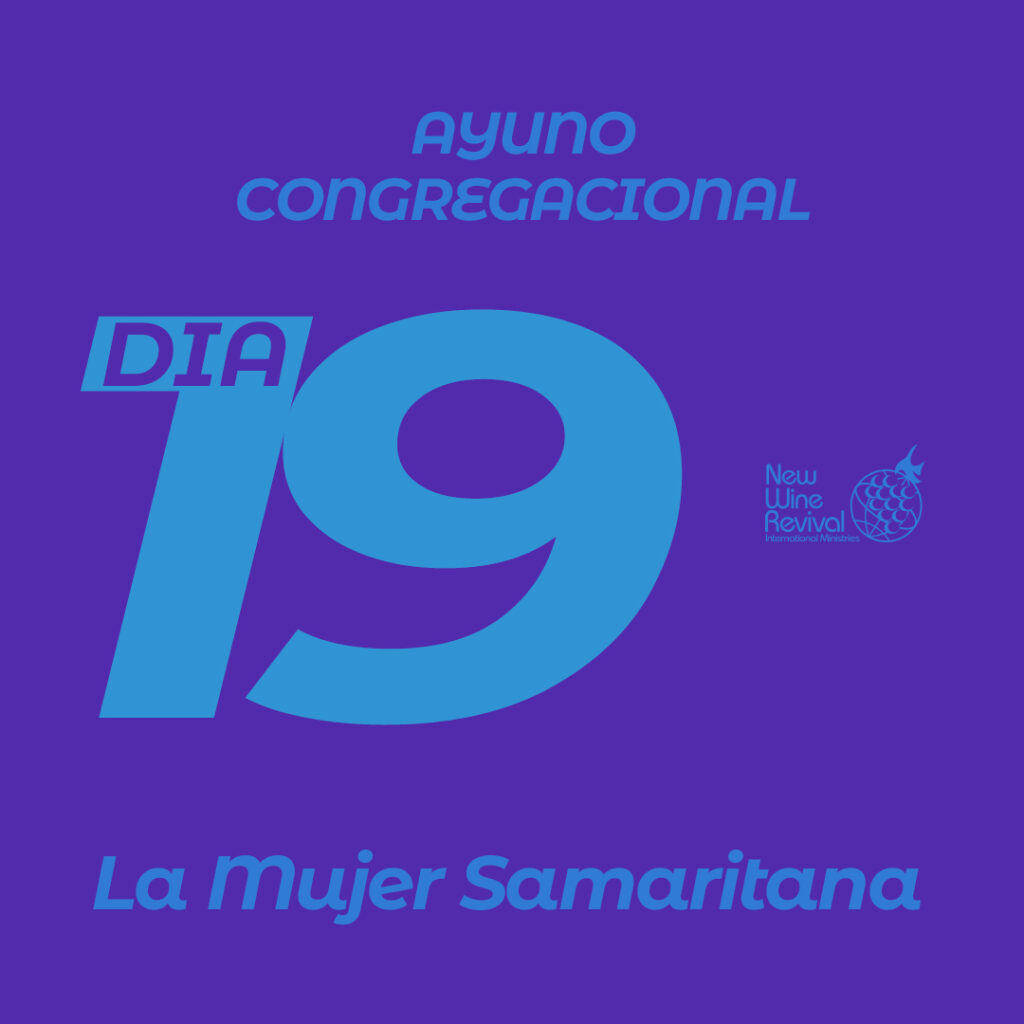
La mujer samaritana era una mujer de mirada con desdén por los judíos por ser samaritana y despreciada por sus muchas aventuras románticas, difícilmente alguien la hubiera elegido para hacer llegar el evangelio a una región en la que todavía no había sido oído.
Fue una mujer que se gozó que Jesús haya atravesado las barreras culturales, raciales y religiosas para poder revelarse a ella.
Cada día la mujer iba con su cántaro a buscar agua al pozo de Jacob, que estaba justo al lado de Sicar, un pueblo que quedaba a mitad de camino entre Jerusalen y Nazaret. Aunque era en el momento mas caluroso del día, ella lo prefería al atardecer, en que se reunión las mujeres allí. Estaba cansada de sus lenguas infatigables. Resultaba mejor el calor abrasador que sus comentarios afilados.
Se sorprendió, sin embargo, de ver que ese día ya alguien había llegado al pozo, un judío de Galilea, según mostraba su aspecto. Al menos no tenía nada que temer de su lengua, porque los judíos hacian todo lo possible por evitar a los samaritanos, dado que los despreciaban por haberse mezclado con otras razas y no adoraban en el templo de Jerusalén sino en su lugar santo del monte Gerizim. Por una vez estaba contenta de sentirse ignorada, y agradecida también, porque los hombres no les hablaban a las mujeres en publico.
Pero al aproximarse al pozo, aquel hombre la sorprendió al romper las reglas con las que ella contaba para sentirse protegida.
– Dame un poco de agua – Le dijo Jesús.
Qué clase de judío es este?, se preguntó.
Ciertamente no se trata de un fariseo, o hubiese tomado el camino mas largo que rodea Samaría para llegar a Galilea.
Echando la cabeza hacia atrás, le respondió:
-Como se te ocurre pedirme agua, si tú eres judío y yo soy samaritana?
Pero El no se inmutó.
– Si supieras lo que Dios puede dar, y conocieras al que te está pidiendo agua, tú le habrías pedido a él y él te habría dado agua que da vida.
Ella le respondió:
– Señor, ni siquiera tienes con qué sacar agua, y el pozo es muy hondo; de donde pues, vas a sacar esa agua que da vida?
Acaso eres tu superior a nuestro padre Jacob, que nos dejó este pozo, del cual bebieron él, sus hijos y su ganado?
Pero él insistió:
– Ve a llamar a tu esposo, y vuelve acá.
– No tengo esposo. Respondió ella.
– Bien has dicho que no tienes esposo. Le dijo Jesús. Es cierto que has tenido cinco, y el que ahora tienes no es tu esposo. En esto has dicho la verdad.
Los siguientes versículos nos muestran la forma como ella trató de cambiar el tema varias veces, haciéndole ver que él era un profeta y mencionando los lugares de adoración, pero Jesús vuelve a interrumpirle diciendo:
– Créeme, mujer, que se acerca la hora en que ni en este monte, ni en Jerusalen adorarán ustedes al Padre. Ahora ustedes adoran lo que no conocen; nosotros adoramos lo que conocemos, porque la salvación proviene de los judíos. Pero se acerca la hora, y ha llegado ya, en que los verdaderos adoradores rendirán culto al Padre en espíritu y en verdad, porque así quiere el Padre que sean los que le adoren.
La mujer respondió:
– Se que viene el Mesías, al que llaman Cristo. Cuando él venga nos explicará todas las cosas.
Entonces Jesús declaró:
– Ese soy yo, el que habla contigo.
Dejando su cántaro de agua, la mujer volvió a la ciudad y le dijo a los hombres:
– Vengan a ver a un hombre que me ha dicho todo lo que he hecho. No será este el Cristo?
Entonces salieron de la ciudad, y vinieron a él.
La mujer quedó profundamente tocada por sus palabras, que declaraba delante de quien quisiera oírla:
– Me ha dicho todo lo que he hecho.
Los samaritanos le insistieron a Jesús para que se quedara dos días y muchos llegaron a creer. Le dijeron a la mujer:
– Ya no creemos solo por lo que tu dijiste; ahora lo hemos oído nosotros mismos, y sabemos que verdaderamente éste es el Salvador del mundo.
En esta historia vemos a una mujer que tiene un encuentro cercano con Jesús, a quien ella no reconoce al principio, sino hasta que él le dice quien es ella y le menciona los cinco maridos que ella ha tenido, no con el fin de señalarla o avergonzarla, sino con el fin de perdonarla y liberarla por todo sentimiento de culpa que ella tenía y por haber sido señalada por todos. Fue la forma como Jesús quiso hacerle entender la necesidad que ella tenía de él, pero sobre todas las cosas, fue una muestra de que Jesús nos conoce muy bien y que a pesar de nuestros pecados él nos ama profundamente.
Lo importante de todo esto es que ella no se quedó con lo que vió y recibió, sino que salió corriendo a decirle a los demás que había un Jesús vivo que la amaba, por eso es que la mujer samaritana se convirtió en la primera mujer en evangelizar.
Oración:
Señor, tu sabes todo de mi, aún las cosas que escondo de mi misma. Dame la gracia de admitir mi pecado, y creer que aunque tú me ves, igual me amas. Ayúdame a soltar cualquier cosa que me prive de experimentar el agua viva de tu Espíritu Santo que brota en mi interior. Y que yo sea la portadora de las buenas nuevas de lo que tu has hecho en mi vida. Amén.
The Samaritan Woman
The Samaritan woman was a woman who was looked down on with contempt by the Jews for being a Samaritan and despised for her many romantic adventures, hardly anyone would have chosen her to spread the gospel to a region where it had not yet been heard.
She was a woman who rejoiced that Jesus had crossed cultural, racial and religious barriers in order to reveal himself to her.
Every day the woman went with her jug to fetch water from Jacob’s well, which was right next to Sychar, a town that was halfway between Jerusalem and Nazareth. Although it was the hottest time of the day, she preferred it at dusk, when the women gathered there. She was tired of her indefatigable tongues. Scorching heat was better than sharp comments from her.
She was surprised, however, to see that that day someone had already come to the well, a Jew from Galilee, as she showed her appearance. At least he had nothing to fear from his language, because the Jews did their best to avoid the Samaritans, since they despised them for having mixed with other races and did not worship in the temple of Jerusalem but in their holy place on Mount Gerizim. . She for once she was glad to feel ignored, and grateful too, that men did not speak to women in public.
But when he approached the well, that man surprised her by breaking the rules that she counted on to feel protected from it.
– Give me some water – Jesus said.
What kind of Jew is this? He wondered.
He is certainly not a Pharisee, or he would have taken the longest road around Samaria to get to Galilee.
Throwing her head back, she replied:
-How can you ask me for water, if you are a Jew and I am a Samaritan?
But He he didn’t flinch.
– If you knew what God can give, and you knew the one who is asking you for water, you would have asked him and he would have given you life-giving water.
She replied:
– Sir, you don’t even have to draw water with, and the well is very deep; Where are you going to get that life-giving water from?
Are you superior to our father Jacob, who left us this well, from which he, his sons and his cattle drank?
But he insisted:
– Go call your husband, and come back here.
– I have no husband. She answered.
– Well you said you don’t have a husband. Jesus told her. It is true that you have had five, and the one you have now is not your husband. In this you have told the truth.
The following verses show us how she tried to change the subject several times, making him see that he was a prophet and mentioning places of worship, but Jesus interrupted her again saying:
– Believe me, woman, the hour is coming when neither on this mountain nor in Jerusalem will you worship the Father. Now you worship what you do not know; we worship what we know, because salvation comes from the Jews. But the time is coming, and it has already come, when true worshipers will worship the Father in spirit and in truth, because that is how the Father declared it.
The woman replied:
– I know the Messiah is coming, whom they call Christ. When he comes he will explain all things to us.
Then Jesus declared:
– That’s me, the one talking to you.
Leaving her pitcher of water, the woman returned to the city and said to the men:
– Come see a man who has told me everything I have done. Is this not the Christ?
So they left the city, and came to him.
The woman was deeply touched by his words, which she declared in front of whoever wanted to hear her:
-He has told me everything I’ve done.
The Samaritans insisted that Jesus stay two days and many came to believe. They told the woman:
– We no longer believe just because of what you said; now we have heard it ourselves, and we know that truly this is the Savior of the world.
In this story we see a woman who has a close encounter with Jesus, whom she does not recognize at first, but until he tells her who she is and mentions the five husbands she has had, not in order to point her out or shame her, but in order to forgive her and free her for all feelings of guilt that she had and for having been singled out by everyone. It was the way that Jesus wanted to make her understand her need for him, but above all, it was a sign that Jesus knows us very well and that despite our sins he loves us deeply.
The important thing about all this is that she did not keep what she saw and received, but ran out to tell others that there was a living Jesus who loved her, that is why the Samaritan woman became the first woman to evangelize.
Prayer:
Lord, you know everything about me, even the things that I hide from myself. Give me the grace to manage my sin, and believe that even though you see me, you still love me. Help me to let go of anything that prevents me from experiencing the living water of your Holy Spirit that flows within me. And may I be the bearer of the good news of what you have done in my life. Amen.



